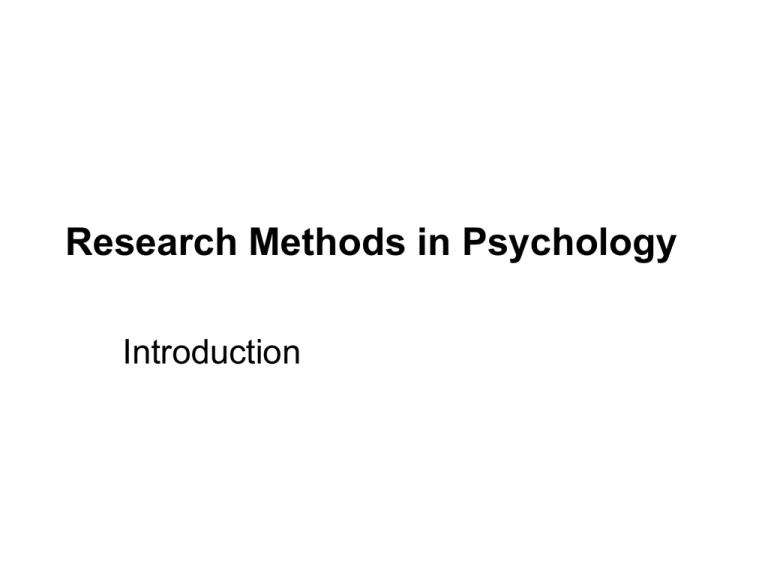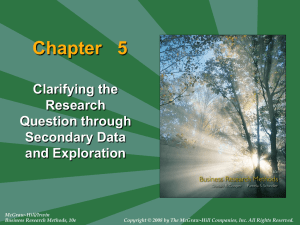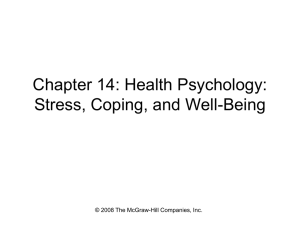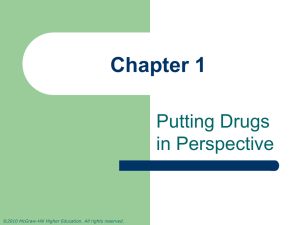
Research Methods in Psychology
Introduction
© 2009 by The McGraw-Hill Companies, Inc.
The Science of Psychology
Psychologists
• develop theories
• conduct research
• answer questions about behavior and mental
processes
© 2009 by The McGraw-Hill Companies, Inc.
Exposure to media violence causes
Example: Media Violence and Aggression
• increase in aggressive thoughts, emotions,
and behaviors
• short- and long-term effects
Effects of media violence
• consistent across
research studies and methods
people
types of media
© 2009 by The McGraw-Hill Companies, Inc.
Media Violence and Aggression,
continued
Long-term studies
• childhood exposure to media violence
→ adult aggression
Theories about exposure to violence
• “activates” aggressive cognitions and arousal
• models aggressive behaviors
• desensitizes people to violence
© 2009 by The McGraw-Hill Companies, Inc.
Media Violence and Aggression,
continued
Factors affect likelihood of aggressive
response following media violence
• characteristics of viewers
• social environment
• media content
No one is immune to the effects of media
violence
© 2009 by The McGraw-Hill Companies, Inc.
The Scientific Method
“Scientific method”
•
•
•
•
an abstract concept
not a particular technique or method
ways in which scientists ask questions
logic and methods used to gain answers
© 2009 by The McGraw-Hill Companies, Inc.
The Scientific Method, continued
Two important aspects
• empirical approach
• skeptical attitude
© 2009 by The McGraw-Hill Companies, Inc.
The Scientific Method, continued
Empirical approach
• observe behaviors directly
• experimentation
systematic control
© 2009 by The McGraw-Hill Companies, Inc.
Science in Context
Historical, Social/Cultural, and Moral
Historical Context
•
•
•
•
•
increased scope of scientific psychology
psychological organizations: APA, APS
Early 1900s: empirical approach
20th century: computer revolution
shift: behaviorism to cognitive psychology
© 2009 by The McGraw-Hill Companies, Inc.
Science in Context, continued
Social and Cultural Context
• zeitgeist influences
research questions
resources for science
society’s acceptance of psychological research
• potential bias of ethnocentrism
© 2009 by The McGraw-Hill Companies, Inc.
Science in Context, continued
Ethnocentrism bias
• understand behavior of individuals in different
culture through framework of own culture
• be aware of cultural influences
© 2009 by The McGraw-Hill Companies, Inc.
Science in Context, continued
Examples of potential ethnocentric bias
• Do we ask questions of
deficits vs. strengths in aging people?
aggression vs. nurturance and race?
• Consider research questions that go against
stereotypes
© 2009 by The McGraw-Hill Companies, Inc.
Science in Context, continued
Ethnocentric bias influences how we
interpret behavior
• Stereotypes based on dress or hairstyle
(e.g., “Goths,” HipHop)
• Has your behavior ever been interpreted in
terms of an ethnocentric bias?
© 2009 by The McGraw-Hill Companies, Inc.
Science in Context, continued
Moral Context
• high standards for integrity and ethical
conduct
• scientists do not
fabricate data
plagiarize
selectively report research findings
© 2009 by The McGraw-Hill Companies, Inc.
Science in Context, continued
Ethical Principles of APA
Evaluate research dilemmas involving
• risks and benefits
• deception
• animal research
© 2009 by The McGraw-Hill Companies, Inc.
Thinking Like a Researcher
Think like a researcher
• be skeptical
• even of claims based on “published” findings
• and claims presented in the media
Strongest evidence
• converging evidence
• but all claims are probabilistic
© 2009 by The McGraw-Hill Companies, Inc.
Thinking Like a Researcher, continued
Science and Legal System
• Both make decisions based on evidence
• Legal system
small amount of evidence leads to suspicion
large amount of evidence is needed to convict
© 2009 by The McGraw-Hill Companies, Inc.
Thinking Like a Researcher, continued
Scientific Evidence
varies according to strength of evidence
•
•
•
•
description
prediction
evidence for the cause of a behavior
replications (repetitions)
Stronger evidence → more confident
claims about behavior
© 2009 by The McGraw-Hill Companies, Inc.
Evidence and Decision Making
Quality & Extent of
Legal Decision
Evidence
suspicion of guilt
low
arrest
description
prediction
arraignment
conviction
Scientific Decisions
statement about
causes
high
replication of findings
© 2009 by The McGraw-Hill Companies, Inc.
Guidelines for Evaluating Reports of
Psychological Research
Pseudoscience ≠ science
Be skeptical
Scientists may disagree
Research is generally about averages
Go to the original source
© 2009 by The McGraw-Hill Companies, Inc.
Getting Started Doing Research
What should I study?
• Choose a research topic by reviewing
psychology journals
textbooks
courses
© 2009 by The McGraw-Hill Companies, Inc.
Getting Started, continued
Research hypotheses
A hypothesis (plural: hypotheses) is
• a tentative explanation for a phenomenon
• stated in the form of a prediction and an
explanation
© 2009 by The McGraw-Hill Companies, Inc.
Getting Started, continued
Example hypothesis
• Research participants who play violent video
games are predicted to behave more
aggressively than participants who passively
watch televised violence
because
video-game participants’ aggression is
reinforced (rewarded) while playing the game
© 2009 by The McGraw-Hill Companies, Inc.
Getting Started, continued
A different hypothesis
• Research participants who play violent video
games are predicted to behave less
aggressively than participants who passively
watch televised violence
because
video-game participants have the opportunity
to release any aggressive impulses
© 2009 by The McGraw-Hill Companies, Inc.
Getting Started, continued
How to develop a hypothesis
•
•
•
•
Consider exceptions from a general trend
Imagine how you would behave in a situation
Consider similar problems and responses
Perform sustained observations of a person or
phenomenon
• Consider counterexamples for an obvious conclusion
• Use ideas or theories from other disciplines
• Read reports of psychological research
© 2009 by The McGraw-Hill Companies, Inc.
Getting Started, continued
Is the research question a good one?
•
•
•
•
•
scientifically important?
scope?
likely outcomes?
psychological science advanced?
anyone interested in the results?
© 2009 by The McGraw-Hill Companies, Inc.
The Multimethod Approach
One scientific method
Many psychological research questions
and research methods
different areas of psychology require
multiple methods
• clinical, social, industrial/organizational,
developmental, counseling, physiological,
cognitive, educational, personality, human
factors, neuropsychology, etc.
© 2009 by The McGraw-Hill Companies, Inc.
The Multimethod Approach, continued
No single research method of technique
can answer all of the different questions in
psychology
Multimethod approach
→ more complete understanding
© 2009 by The McGraw-Hill Companies, Inc.
The Multimethod Approach, continued
No perfect research method
• each method or measure of behavior has
flaws
Multimethod approach
• flaws associated with any particular method
are overcome by other methods to fill in the
gaps
© 2009 by The McGraw-Hill Companies, Inc.
The Multimethod Approach, continued
“Toolbox” with different tools for conducting
research
Focus of this class
• introduce different research tools
© 2009 by The McGraw-Hill Companies, Inc.
Steps of the Research Process
Develop a research question
• Be aware of ethnocentrism
• Gain personal experience doing research
• Read psychological literature
Generate a research hypothesis
• Read psychological theories on your topic
• Consider personal experience, think of
exceptions, and notice inconsistencies in
previous research
© 2009 by The McGraw-Hill Companies, Inc.
Research Steps, continued
Form operational definitions
• Look to previous research to see how others
have defined the same constructs (concepts)
• Identify the variables you will examine
Choose a research design
• Decide whether your research question seeks
to describe, allow prediction, or identify causal
relationships
• Choose the appropriate research design for
your question
© 2009 by The McGraw-Hill Companies, Inc.
Research Steps, continued
Evaluate the ethical issues
• Identify the potential risks and benefits of the
research and the ways in which participants’
welfare will be protected
• Submit a proposal to an ethics review
committee
• Seek permission from those in authority
© 2009 by The McGraw-Hill Companies, Inc.
Research Steps, continued
Collect and analyze data; form
conclusions
• Get to know the data
• Summarize the data
• Confirm what the data reveal
© 2009 by The McGraw-Hill Companies, Inc.
Research Steps, continued
Report research results
• Present the findings at a psychology
conference
• Submit a written report of the study to a
psychology journal
© 2009 by The McGraw-Hill Companies, Inc.
Discussion Questions
Have you heard or read media reports
about psychological research?
• Did you accept the report without questions?
Why or why not?
• Did you have enough information?
What do other scientists say about the topic?
Could the reporter be biased?
© 2009 by The McGraw-Hill Companies, Inc.
Discussion Questions, continued
Do you remember ever being skeptical
about research presented in the media?
• Why were you skeptical?
• What information would have made you less
skeptical?
• Did a finding seem “too good to be true”?
• Did anyone have anything to gain through the
report?
• Have the findings been replicated (repeated)?
© 2009 by The McGraw-Hill Companies, Inc.
Discussion Questions, continued
What research topics in psychology
interest you?
• What hypotheses can you form about your
topic?
What relationships might exist between variables
(factors) you’ve identified?
Can you make predictions regarding your topic?
Can you identify potential causes for the behavior
or phenomenon?
© 2009 by The McGraw-Hill Companies, Inc.
Discussion Questions, continued
Does your cultural background influence
your choice of topic and hypotheses?
• Would people with different backgrounds view
your topic similarly?
• Consider people with different sex, age, racial,
socioeconomic status than yourself
Might these characteristics make a difference
for your topic?
• Are there other cultural variables that would
make a difference?
© 2009 by The McGraw-Hill Companies, Inc.
Discussion Questions, continued
What research topics and theories are
currently popular among psychologists?
What research topics are investigated at
your school?
© 2009 by The McGraw-Hill Companies, Inc.
Discussion Questions, continued
How might our current social and cultural
context be related to the prominence of
certain research topics?
To what extent does ethnocentrism play a
role in the prominence of current research
topics?
© 2009 by The McGraw-Hill Companies, Inc.









